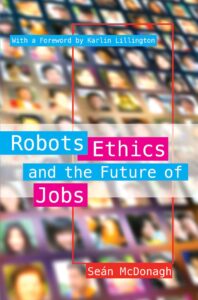We must buy less clothes Fr Sean McDonagh warns as he highlights the impact of fast fashion on our waste crisis, on those who work in the industry, and the climate cost of producing plastic-based textiles.
Research published In May 2023 by the University of Exeter’s Global System Institute in Britain and Nanjing University in China predicted that two billion people globally will be exposed to extreme weather towards the end of this century.[1]
The reason is simple. The use of fossil fuels in our homes and transport will produce an average rise in temperature of 2.7 degrees by the year 2,100.
Pope Francis calls this another example of the “ecological debt” which rich nations have contracted through colonialism and the use of fossil fuel to drive their industries for almost two centuries. Climate change effects the poor most, especially in Africa and Asia, because, among other things, it is devastating farming.[2]
And the numbers of humans affected are huge: 300 million people in Nigeria and 600 million people in India will face extreme weather conditions.
It doesn’t have to be like that. Humans can limit the increase in temperature to 1.5 degrees Celsius as suggested by the Paris Agreement in 2015. This would mean that only 400 million people would experience extreme temperatures globally.[3]
When speaking of fast fashion, we forget that it’s very unjust to those who work in the industry. 10 years ago, the Rana Plaza factory collapsed in Bangladesh killing 1,134 people. Most of them were women. Parts of the building were completed without proper permits.
Today it is estimated that 75 million women are involved in the industry and are very poorly paid, even though some of them have extraordinary knitting and embroidery skills.[4]
It is also clear that the explosion of fast-fashion clothes is adding to the waste crisis. The sheer volume of fast-fashion clothes means that a lot the clothes are either incinerated or sent to countries in Africa. In 2019 alone, 185,000 tonnes of second-hand clothes were imported in Kenya.
But fast-fashion is also causing climate change. Oil and gas are used to create polyester which is used in half the clothes produced today. And the change is taking place quickly since the volume of polyester has doubled in the past 20 years.[5]
At the moment it is estimated that fast-fashion is responsible for between 8-10% of fossil fuel use today and the percentage is rising every year. So, while governments and the Intergovernmental Panel on Climate Change (IPCCC) is trying to get us to use less fossil fuels, we are using more and more in polyester clothes, much of it we do not need.
Each year, more than half a billion tonnes of plastic microfibres from washing plastic-based textiles such as nylon, acrylic and polyester end up polluting the oceans and rivers. When the clothes are brought to landfills, they pollute, the soil, water, and air with plastic microfibres and hazardous chemical compounds.
Microfibres are now found in the Arctic Ocean as well as in 80 percent of the world’s tap water, in people’s lungs and even in the placentas of unborn babies.[6] Unfortunately, we are not sure how plastics will affect our health in the long run, but it is very worrying.
In Ireland, Pippa Hackett, a member of the Green Party and the minister of state at the Department of Agriculture, Food and Marine, says the most effective way to stop this fast-fashion industry is to buy second hand clothes.
“In my role, I feel it’s important to highlight the potential damage there is, not only to the environment in the manufacturing and the disposal of clothing, but also to the human and the workers’ rights issues associated with the people that make these clothes.”[7]
The Society of St Vincent de Paul has over 230 local Vincent’s charity shops located in every county in Ireland, so shopping in these stores should not be difficult.
Young and old must be challenged to buy less and less clothes. I will leave the last line to Pope Francis. “Purchasing is always a moral – not simply economic – act. Today, the issues of environmental degradation challenges us to examine our lifestyle. (Laudato Si’ 206).
[1] Rebecca Speare-Cole, Climate policy will leave two billion exposed to dangerous heat by 2100, The Irish Independent, May 23rd, 2023, page 15.
[2] Pope Francis, Laudato Si’ On Care of Our Common Home, Number 51. Veritas Publication, 2017.
[3] ibid
[4] Helie Abelvik-Lawson, how fast fashion fuels climate change, plastic pollution and violence, April 3rd,2023. https://www.sustainablefashionweek.uk/opinion/yn6xn2ir7iacm4o3s0lsrnwjv51t32
[5] Ben Chapman, ‘Fashion industry has developed ‘danger addiction to fossil fuel, say campaign groups,’ February 4th 2021: https://www.independent.co.uk/news/business/fast-fashion-polyester-climate-crisis-plastic-pollution-b1797190.html
[6] Ben Chapman, op,cit
[7] Elaine Loughlin, Green minister leads by example and wears pre-loved clothes, The Irish Examiner, May 27th, 2023, page 11.
Fr Sean McDonagh was ordained a priest in 1969. He worked in Mindanao in the Philippines amongst the T’boli indigenous people near Lake Sebu where he witnessed first hand the destruction of the local forests. His most recent publication is ‘Robots, Ethics and the Future of Jobs’ published by Messenger Publications: https://www.messenger.ie/product/robots-ethics-and-the-future-of-jobs/


